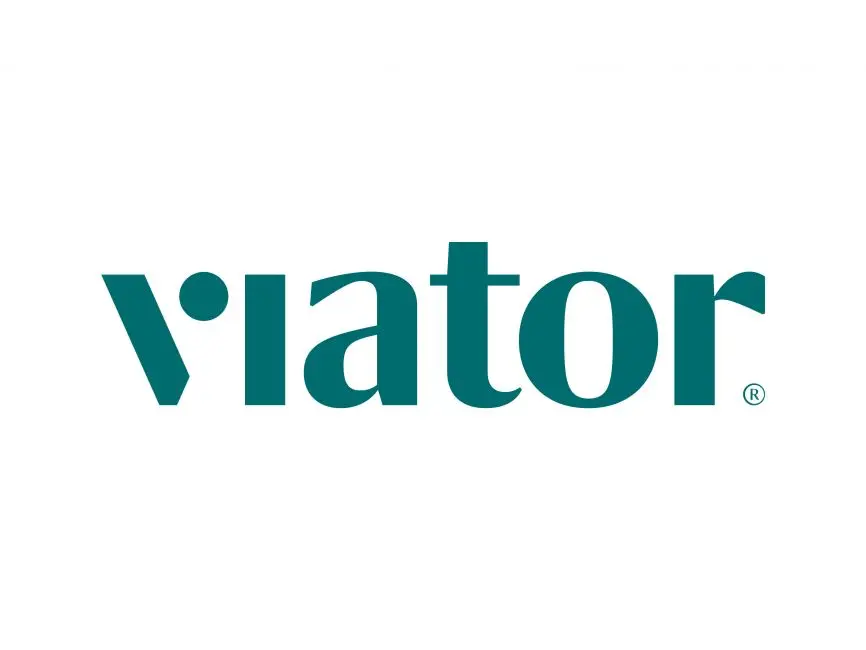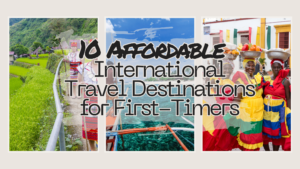It’s good to have the time to search for the next hotel with cheaper rates. Thankfully, mobile applications are able to make searching and finding hotels easier. Hotel booking in advance can be amazingly helpful for those traveling and wanting to avoid the inconvenience. You may even book direct with your preferred platform, and have access to privileged discounts and perks like keyless access, and easy check-in and checkout.
Modern travel has been revolutionized by the fast-evolving landscape of technology, ditching the old ways of plotting routes on paper maps, and forever changing the way we plan, book hotel, and experience our journeys.
The Evolution of Hotel Booking

The history of hotel booking is a fascinating journey in itself. Travel agents were once the keepers of exploration, finding the best hotel for us, and creating personalized travel plans. But the internet’s explosive growth ushered in a new era of self-service travel, empowering individuals to become their own travel agents. Online hotel booking apps and hotel booking sites like Expedia and Booking.com emerged, offering countless options at our fingertips.
The Role of Technology in Modern Travel

Technology’s insatiable march continues to shape the travel landscape. Hotel booking apps have become our constant companions, offering better deals, real-time information, booking capabilities, and navigation assistance. From comparing hotel prices, checking reviews, managing itineraries, and last-minute bookings, hotel booking apps have become indispensable travel tools.
Today’s traveler craves authenticity and unique experiences. Technology’s response to that is by enabling personalized travel planning through AI-powered hotel booking apps that give real-time updates and recommendations tailored to individual preferences and budgets.
The Importance of Choosing the Right Accommodation
Technology is empowering. Hotel apps give you the power to find your perfect home away from home. Because finding the perfect accommodation goes hand in hand with having a fulfilling travel experience.
This technology-driven evolution of travel booking has made travel more accessible and personalized than ever before. As it continues to evolve, booking hotels is now as easy as a few taps. Expect even more innovative solutions in hotel booking apps that will transform the way we travel.
Major Players in the Travel Industry: The Best Apps and Websites for Booking Accommodation
1. Booking.com

- $118.43 bn market cap
- $20.630B annual revenue as of September 30, 2023
Booking.com boasts the largest inventory of accommodations – hotels vacation rentals, with over 28 million reported listings, including over 6.6 million vacation homes, apartments, and other unique places to stay. This caters to the diverse needs of other travelers, offering them an unmatched selection of o2ptions to choose from.
(Booking Holdings include Kayak, Rentalcars.com, OpenTable, Priceline, and Agoda)
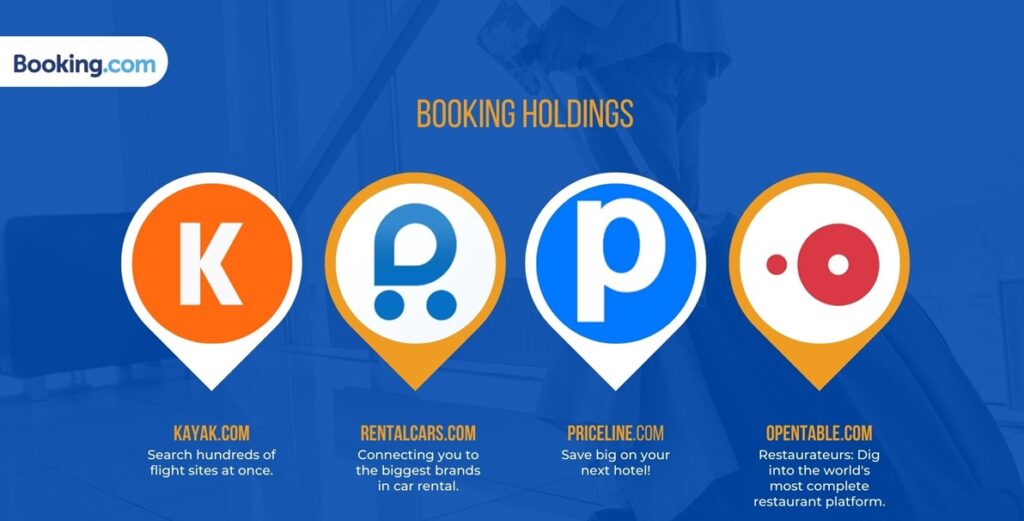
Booking.com actively negotiates with accommodation providers to secure the best rates for its users. They offer various rewards program, promotions and discounts, including Genius discounts and seasonal deals, making them a cost-effective solution for travelers seeking value for their money.
Its website and mobile app are known for their intuitive interface, user-friendly design, and advanced search filters. Travelers can easily find and compare hotel prices, navigate their bookings, manage their travel itinerary and hotel accommodation in a streamlined manner.

It provides detailed information about hotel rooms, including high-quality photos, descriptions, amenities, and guest reviews. This transparency and access to valuable information empower travelers to make informed decisions and choose the perfect stay for their needs.
Booking.com has a strong reputation for reliability, trust, and customer satisfaction. Its commitment to providing a positive user experience, coupled with its innovative features and robust platform, has cemented its elite status as a leader in the travel industry.
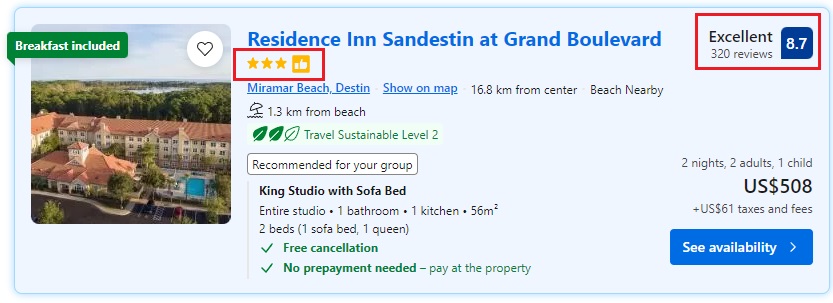
It continuously invests in technology, offering virtual tours, and integrating AI-powered tools in its hotel booking app to optimize search results and provide relevant suggestions.
It prioritizes customer service by providing 24/7 support in 43 languages. This readily available assistance ensures a smooth and stress-free experience for travelers throughout their booking process.
Booking.com engages in marketing campaigns and partnerships to reach a wider audience and solidify its brand recognition. This strategy contributes to its continued growth and dominance in the online travel booking market.
Recognizing the increasing trend of mobile bookings, Booking.com prioritizes a mobile-first approach. Its hotel booking app offers all the functionalities of the website, optimized for a convenient and user-friendly experience on the go.
2. Agoda

- $760 million annual revenue
Agoda boasts a strong presence in Asia, particularly Southeast Asia, which is a rapidly growing travel market. Its deep understanding of the region’s cultural nuances, preferred booking methods, and popular tourist destinations allows it to cater effectively to local travelers and international visitors alike.
The platform provides up to 50% off on accommodations worldwide and offers various promotional features, including Agoda Special Offers and Agoda Cash, a loyalty program. It also negotiates with accommodation providers to secure the best rates. This focus on affordability makes them a popular choice for budget-conscious travelers.
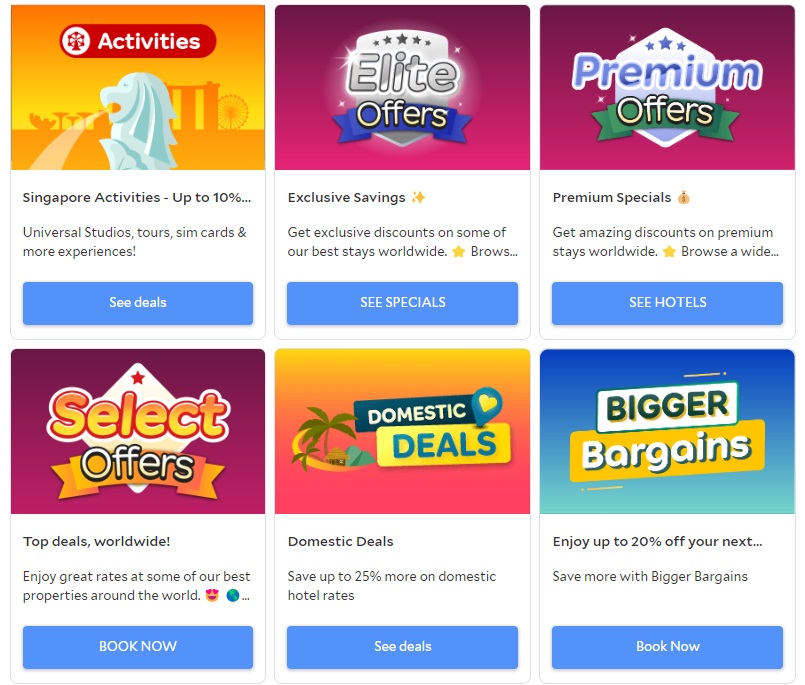
Agoda’s user-friendly hotel booking app allows granular searches based on various criteria, offline access to booking details, and convenient features like mobile check-in – making it easy for users to find the perfect hotel rooms for their needs.
Agoda goes beyond the conventional to give its users accommodation options that include apartments, villas, and unique stays like treehouses and homestays. This caters to the growing demand for alternative lodging experiences and attracts travelers seeking a more authentic and immersive travel experience.
In addition to 2.9 million properties, Agoda allows users to book hotels at the lowest prices, discounted flights, rental cars, and hotel and resort packages, providing a one-stop solution for travel planning.

Agoda uses targeted online advertising. It collaborates with travel influencers, and partners with airlines and other travel agencies to reach a wider audience and attract new users.
It employs a large team of local employees across Asia who offer invaluable expertise and knowledge of the local travel landscape. This allows them to provide personalized recommendations, offer localized support, and cater to the specific needs of regional markets.
3. Airbnb
- $54.1 bn market cap
- 8.4bn USD – Airbnb worldwide revenue
Airbnb has carved out an elite status in the travel accommodation industry, setting itself apart from other sites. Its core strength lies in its vast range of unique and diverse rentals. Unlike most hotels with standardized rooms, Airbnb offers apartments, houses, cabins, treehouses, yurts, and even boats and castles. This variety caters to travelers seeking authentic experiences and a more personal connection to their destination.
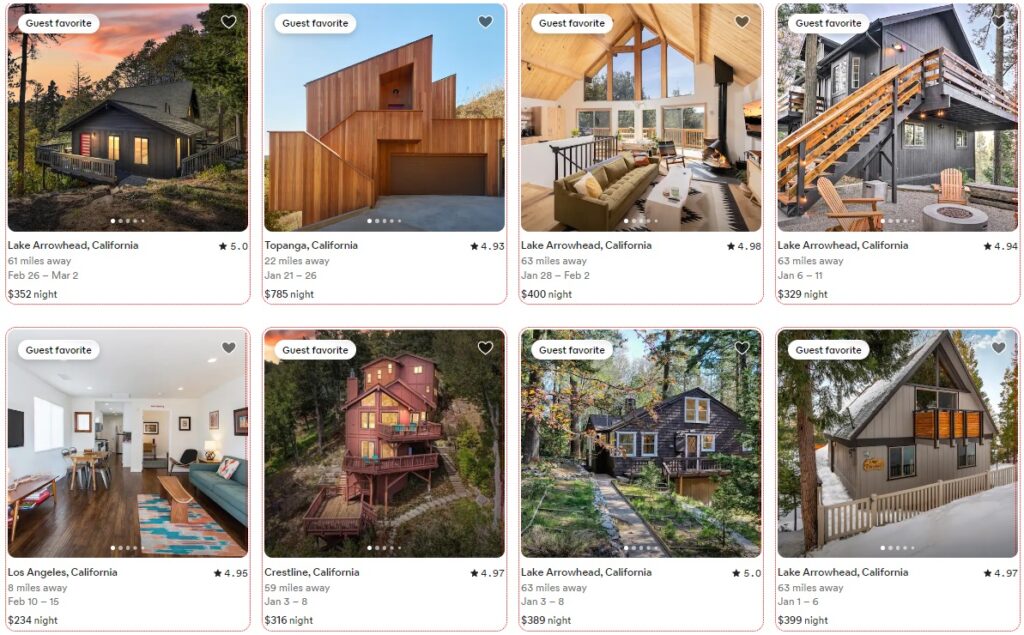
Each Airbnb listing includes a detailed description of the property, including photos that allow guests to make informed decisions about their stay.
Airbnb allows travelers to live like locals by staying in authentic neighborhoods and interacting directly with hosts. This fosters a sense of immersion and cultural exchange, offering a deeper understanding of the local way of life.
Hosts have the freedom to set their prices and customize their listings, while guests can tailor their searches based on specific criteria such as property type, amenities, and location. They provide local recommendations, tips, and insights, enhancing the overall travel experience. This personalized touch adds a human element that’s often missing in traditional hotels.
Certain hotels in Airbnb can have the highest price. But many can also be availed at great prices. The amenities and space offered by rentals are often better than that of a standard hotel room, providing greater value for money.
Airbnb allows travelers to choose from various lengths of stay, arrival and departure times, and free cancellation policies. This caters to diverse travel styles and preferences, offering a more customized experience.
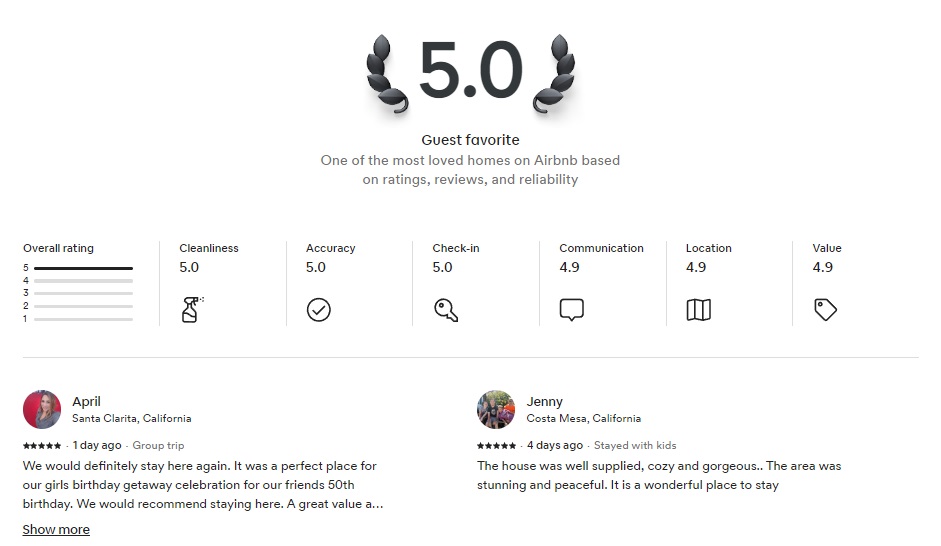
Local Airbnb hosts offers additional services such as tours or cooking classes for cultural immersion. Guests can also enjoy amenities like transportation or fitness facilities during their stay.
Airbnb promotes responsible tourism by encouraging stays in local communities and offering eco-friendly rentals. This focus on sustainability aligns with the growing trend of conscious travel, attracting travelers who want to contribute positively to the places they visit.
4. Expedia

- $20.12 bn market cap
- 11.67bn USD – Expedia Group, Inc. worldwide revenue.
Expedia is one of the world’s leading full-service hotel booking platforms that help travelers easily plan and book travel from the widest selection of vacation packages, flights, hotels, rental cars, rail, cruises, activities, attractions, and services.
Companies under the Expedia Group:

Expedia offers a one-stop shop for all your travel needs. This eliminates the need to visit other sites, streamlining the travel planning process.
Expedia leverages its vast data and pricing algorithms to offer lower prices based on demand and user preferences. This ensures users get the best deals available while maximizing revenue for travel partners.
Expedia offers a tiered loyalty program and rewards program that give frequent travelers with points redeemable for the best hotel deals – travel discounts, hotel room upgrades, and other exclusive perks. This incentivizes repeat usage and fosters brand loyalty.

Expedia’s hotel booking app uses AI and machine learning to personalize the user experience. It allows users to book their entire trip, manage their itinerary, and access travel documents on the go.
Expedia’s best app offers great deals, including up to 20% off on select hotels when booking through the app. Users can save money and earn OneKeyCash in the app and benefit from Expedia’s Price Tracking tool to know when’s the best time to book their next flight.
The app offers a “Book Now, Pay Later” functionality, which provides users with more flexibility in their booking and payment options. You pay on the same day you get to the property. It also provides live itinerary updates, instant alerts when a hotel room price drops, and notifications to help you before, during, and after your journey.
Discover your new favorite stay.
Expedia operates in over 200 countries and territories, offering a vast selection of many hotels worldwide. Its strategic partnerships with airlines, hotel booking sites, and other travel providers expand its reach and enhance its offerings.
Expedia recognizes the importance of sustainable travel and offers various eco-friendly options, including green hotels, carbon offset programs, and sustainable travel tips. This commitment attracts environmentally conscious travelers and aligns with the evolving travel landscape.
5. Marriott International Inc

- $63.69 bn market cap
- $23.54 bn current total revenue
Marriott owns the largest inventory of hotel rooms (1,423,044) globally, spanning over 8,700 properties across 139 countries and territories. The hotel name alone is synonymous with excellent service and unparalleled accessibility.
This elite status of most properties under Marriott comes from the luxury brands the Ritz-Carlton Hotel Companies, St. Regis, The Luxury Collection, EDITION, JW Marriott, Bulgari Hotels & Resorts, and W Hotels. To premium brands Marriott Hotels, Sheraton, Marriott Vacation Club, Delta, Le Meridien, Westin, Autograph Collection, Renaissance, Tribute Portfolio, Gaylord, and Design Hotels.

And select properties brands Courtyard, Four Points by Sheraton, SpringHill Suites, Fairfield by Marriott, AC, Aloft, Moxy, and Protea Hotels.
Each brand is segmented by tier, and defined as either Classic, which offers time-honored hospitality experiences for the modern traveler, or Distinctive, which offers memorable lifestyle-driven experiences with a unique perspective.
Marriott Bonvoy, the company’s loyalty program, has over 186 million members. This rewards program offers valuable rewards and benefits, including travel packages, points for an extended hotel stay, hotel room upgrades, free breakfast, additional discounts, special deals, and access to members-only experiences. This incentivizes repeat hotel stays and fosters brand loyalty among frequent travelers.
Marriott enjoys strong financial performance and a consistent track record of profitability. This financial stability provides resources for continued growth, brand development, and investment in innovative technologies and initiatives. Marriott has a strong presence in North America, Europe, Africa, the Middle East, Asia-Pacific, the Caribbean, and Latin America.
6. Trivago
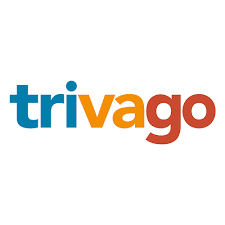
- $0.90 bn market cap as of December, 2023
- $0.53 bn current revenue as of September, 2023
Trivago acts as a metasearch engine that focuses mainly on hotel price comparison. Unlike Booking.com or Expedia, Trivago doesn’t hold hotel inventory or booking accommodations. Instead, it aggregates hotel deals from over 250 booking websites and displays them side-by-side for users to compare prices, and book hotels for the lowest price.

It doesn’t overwhelm users with an array of booking options. It focuses on presenting hotel information and prices, allowing users to choose the best hotel, and their preferred booking platform once they’ve found the best deal. This streamlined approach simplifies the search results and avoids booking platform bias.
Trivago’s platform covers more than 5 million hotels and other types of booking accommodations, with its sites available in 190 countries. Its sophisticated metasearch algorithm leverages user preferences, search criteria, and past booking behavior to display relevant hotel options.
You can refine your search by using filters based on the best prices, location, amenities, star rating, guest reviews, and more. This personalization and control enhance the user experience and increase the likelihood of finding the perfect hotel.

Trivago’s user-friendly site and app display high-quality photos of a specific hotel, concise property descriptions. Although there are secret prices that are not on display, most prices are visible to make it easy for users to quickly understand and compare options. This visual approach simplifies the decision-making process.
Trivago doesn’t charge a booking fee. Many sites like Trivago generate revenue through cost-per-click (CPC) partnerships with booking websites. When users click on a hotel deal displayed on Trivago, they’re directed to the booking platform, and Trivago earns a commission. This model incentivizes Trivago to provide accurate and comprehensive results, benefiting both travelers and booking platforms.
7. Tripadvisor

- $6.87 bn market cap as of December 2023.
- $1.492 billion annual revenue

Tripadvisor takes a distinct position in the online travel world by focusing on user reviews, recommendations, and community, rather than direct booking. While not directly comparable to platforms like Booking.com or Expedia in terms of annual revenue and market cap, Tripadvisor holds its own in the industry with a valuable offering for travelers and businesses alike.
Tripadvisor boasts the largest online travel community, with over 870 million reviews and 500 million unique monthly visitors. This invaluable user-generated content empowers travelers to make informed decisions based on real experiences, opinions, and recommendations.
Beyond hotels, Tripadvisor offers information and reviews for restaurants, attractions, experiences, and tours. This allows travelers to plan their entire trip in one place, fostering a more holistic travel planning experience.

TripAdvisor generates revenue from various sources, including hotels, media & platforms, experiences & dining, and other revenues. This diversification helps the company maintain a steady income stream even during times when specific sectors face challenges. It also provides valuable exposure for businesses.
8. Hostelworld

- $66.8 million in annual revenue, as of June 30,2023.
- $195.5 million market cap as of December 13,2023.
Hostelworld is one of the popular websites that cater specifically to budget-conscious and social travelers seeking hostel accommodation. While its financial numbers might not compete with the other giants in the online booking industry, Hostelworld holds a valuable position for a dedicated traveler segment.
Hostelworld offers access to over 17,000 properties in over 180 countries. This caters to a specific traveler segment seeking affordable and social accommodation options.
Hostels often offer unique experiences like pub crawls, walking tours, and game nights, providing added value beyond just a bed. The shared facilities and communal atmosphere also contribute to a cost-effective travel option.
9. Vrbo

- $24.35B current market cap.
Vrbo (aka Vacation Rentals by Owner) is an online marketplace for home rentals. It’s owned by Expedia Group and is based in Austin, Texas. Vrbo connects homeowners with families and vacationers looking for alternative accommodation options such as condos, cabins, lake rentals, and beach houses. With over 2 million bookable vacation rentals, Vrbo allows users to book hotels and other types of properties in destinations worldwide.

Vrbo is popular among travelers looking for a more personalized and affordable vacation experience. Homeowners offer unique amenities and experiences that you won’t find in a hotel, such as private pools, hot tubs, game rooms, and more.
Vrbo prices are often lower. This can save you money for your next trip. With its wide selection of properties, personalized amenities, and affordable prices, Vrbo can be suitable for different types of trips, including family vacations, weekend getaways, or adventurous excursions. It provides a one-stop-shop experience for users to compare properties with the lowest price, read reviews, and make reservations, catering to diverse customer needs and preferences.
Trip.com

Trip.com is a Shanghai-based international online travel agency owned by Trip.com Group (Skyscanner, MakeMyTrip, Qunar, Travix), one of the world’s largest online travel agencies with more than 400 million users worldwide. Trip.com offers a one-stop-shop experience for customers to book the best hotel, flight, and even train tickets – catering to diverse customer needs and preferences.

With over 1.4 million hotels in more than 200 countries and 30 million real guest reviews, Trip.com provides quality travel services in over a dozen languages, including English, Mandarin, Cantonese, Japanese, Korean, German, French, and Spanish. The platform also offers various tools such as flight fare alerts, deal search filters, and real-time flight status tracking to help customers customize their travel experience and find the best deals.
Trip.com holds a formidable position in the online travel world, particularly within the Chinese market.
- $7.4 billion in current revenue, as of September 30, 2023.
- $68.6 billion market cap as of December 13, 2023.
Trip.com boasts a 74% market share in China, making it the largest online travel agency in the region. This strong local presence and deep understanding of Chinese traveler preferences give them a significant advantage.
Trip.com offers the best price and attractive package deals, including flights, hotels, activities, and even car rentals. This focus on value resonates with Chinese travelers seeking good deals and unique travel experiences.

Trip.com partners with Chinese airlines, hotels, and other travel providers to allow them to offer exclusive deals, integrate local payment methods, and cater to the specific needs of Chinese travelers.
Trip.com is gradually expanding its global reach through strategic acquisitions and partnerships to broaden its appeal and increase its competitive edge in the international market.
Specialized (Niche) Platforms
For specific travel styles or needs, niche platforms like Airbnb, Hostelworld, and Glamping Hub offer curated experiences. Airbnb focuses on unique vacation rentals, Hostelworld caters to budget-conscious travelers seeking social experiences, and Glamping Hub specializes in glamorous camping accommodations.

Fairtrips.com provides community-based tours that focus on sustainability and authenticity. Galapatours.com provides a comprehensive database of Galapagos cruises, allowing users to filter routes and ships according to their interests, consult with Galapagos experts, and save their spot on the preferred cruise for free for up to ten days.
Polartours.com specializes in polar expedition cruises to the Arctic and Antarctica. The website offers a wide range of polar cruises and allows users to compare different routes and ships, and receive unbiased recommendations from polar expedition experts.
Travel Planning and Management
TripIt is considered the organizational powerhouse of the travel world. It’s a free (with a premium option) travel planning and organization app. It automatically pulls your travel plans from email confirmations and builds a detailed itinerary for all your trips, including flights, hotels, car rentals, trains, and even cruises.
Key features:
You can stop combing through your emails manually. TripIt assembles your travel plans into a single, organized itinerary, accessible anytime, anywhere.
It keeps you informed with real time alerts and updates about any flight delays/cancellations, gate changes, etc.,to ensure you’re in control.
TripIt’s saved itineraries are available offline, so you can navigate confidently even in remote locations without the internet.
You can easily share your itinerary with travel companions, family, or colleagues to keep everyone in the loop and allow for smooth coordination.
TripIt has a free version. TripIt Pro’s featured price is at $49 per year. Or you can avail of its ongoing sale and get TripIt Pro for only $24 (50% off) to save money. It offers premium features like airport lounge access, seat upgrades, and travel insurance comparisons.
Key Takeaways:
Expedia was once a division of Microsoft (travel division services) until it was publicly traded in 1999.
The first Marriott “hotel” started out as a 9-stool root beer stand in Washington, DC. in 1927. It grew into a restaurant chain and evolved into the Marriott International that we know today.

Booking.com was a small startup company founded in Amsterdam in 1996.
Airbnb was started in 2007 by two roommates renting air mattresses in their San Francisco apartment. In short, the major players in today’s huge travel industry didn’t start as giants. The point is, success comes from identifying a need, being resourceful, resilient, and adapting to change.
So remember, booking accommodation is a journey, it’s not a destination. Take your time, compare options, and don’t be afraid to negotiate. With a bit of research, you can secure the perfect place to stay at a lower price that fits your budget and elevates your travel experience.
Book your accommodation with the ones who evolved and grew over time through relentless innovation. Those who prioritize customer satisfaction above all else.






